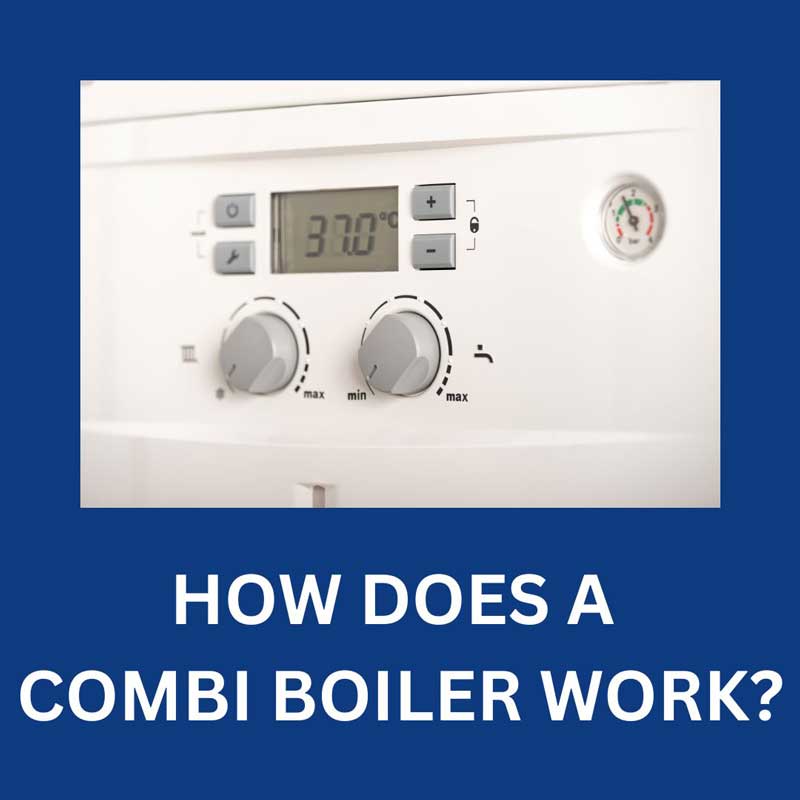
A Combi Boiler is a compact and efficient heating system that powers central heating and provides hot water on demand. It works by drawing water directly from the mains supply, heating it through a heat exchanger, and delivering it instantly to taps and radiators without a separate hot water cylinder or cold water tank.
Understanding How A Combi Boiler Works
Understanding how a Combi Boiler works will help you decide on the best Boiler for your home. Combi Boilers are the number one type in the UK due to their efficiency, compact size, and ability to demand heating and hot water. Whether you’re considering upgrading your existing Boiler or installing a new heating system, knowing how a Combi Boiler works will help you make the best choice for your heating and hot water needs.
What Is A Combi Boiler?
A Combi Boiler, short for combination boiler, is a highly efficient and compact heating system that provides hot water and heating on demand. This dual functionality eliminates hot water cylinders and cold water tanks, making it an ideal choice for homes with limited space.
Key Components Of A Combi Boiler
- Heat Exchanger: The component transfers heat from the Boiler’s burner to the water.
- Diverter Valve: Directs the flow of hot water to the taps or the central heating system.
- Sensors and Controls: Monitor and regulate the Boiler’s operations to ensure optimal performance and safety.
Comparison With Other Types Of Boilers
- Regular Boilers: Also known as traditional boilers, they require a hot water cylinder and a cold water storage tank. They are excellent for homes with high hot water demands.
- System Boilers are similar to Regular Boilers but come with an integrated hot water cylinder, eliminating the need for a separate tank. They are ideal for homes with multiple bathrooms.
Combi Boilers offer a streamlined solution by heating water directly from the mains supply. This results in a more space-efficient and often cost-effective heating system well-suited to small—and medium-sized homes.
How A Combi Boiler Works
Here’s a step-by-step explanation of how a Combi Boiler works:
Cold Water Supply
The process begins with cold water being drawn directly from the main supply. This eliminates the need for a separate cold water tank, which Regular/traditional Boiler systems require.
Heating Process
Once the cold water enters the Combi Boiler, it flows through a primary heat exchanger. Here, the Boiler’s gas burner heats the water, rapidly raising its temperature.
Hot Water Supply
When you turn on a hot tap or shower, a flow sensor detects the demand for hot water. The diverter valve then directs the heated water from the heat exchanger to the hot water outlet, ensuring that hot water is delivered almost instantly to your taps and showers.
Central Heating
When heating is required, the Combi Boiler switches to heating mode. The diverter valve directs the heated water to the central heating system, circulating it through radiators to warm your home. The Boiler’s thermostat monitors the temperature and adjusts the burner’s operation to maintain a consistent temperature.
Role Of The Heat Exchanger
The heat exchanger transfers heat from the gas to the water without mixing the two. Modern Combi Boilers have a condensing heat exchanger, which recycles additional heat from the flue gases, making the Boiler even more efficient.
Role Of The Diverter Valve
The diverter valve is essential for switching between hot water and heating modes. It ensures the hot water reaches the desired outlet, whether your taps, shower, or radiators. This seamless switching mechanism allows the Combi Boiler to provide hot water on demand while heating your home efficiently.
Advantages Of Combi Boilers
Combi Boilers are popular for a reason. Their design and functionality offer several advantages, making them a preferred choice for many UK homeowners. Here are some of the key benefits:
Space-Saving Design
One of the most significant advantages of a Combi Boiler is its compact size. Unlike conventional and system boilers, a Combi Boiler doesn’t require a separate hot water cylinder or cold water tank, Making Combis ideal for small and medium-sized homes where space is at a premium. The entire system is contained within a single unit, often small enough to fit in a kitchen cupboard.
Efficiency & Cost-Effectiveness
Combi Boilers are highly efficient, often achieving 90% or higher efficiencies. This means they convert most of their fuel into heat, reducing energy waste. The efficiency of Combi Boilers translates to lower energy bills and saving money over time. Additionally, modern Combi Boilers often feature condensing technology, improving efficiency by capturing and reusing heat from the flue gases.
Continuous Hot Water Supply
With a Combi Boiler, you get hot water on demand. There’s no need to wait for a hot water cylinder to heat up, as the Boiler heats water instantly if you need it. This ensures a continuous hot water supply which won’t run out.
Reduced Installation Time & Cost
Since a Combi Boiler is an all-in-one unit, installation is swift and simple compared to Regular or System Boilers. There’s no need to install separate tanks or cylinders, which reduces both the time and cost of installation.
Lower Maintenance Requirements
Combi Boilers have fewer components than other types of Boilers, which results in fewer potential points of failure. This simplicity results in lower maintenance needs and costs. Regular servicing by a qualified engineer is still essential, but the streamlined design contributes to a more reliable and easier-to-maintain system.
Improved Water Pressure
Combi Boilers use water from the mains supply, which often means better water pressure than traditional systems that rely on gravity-fed tanks. This can result in stronger showers and faster-filling baths (depending on your home’s water pressure).
Environmentally Friendly
Combi boilers’ high efficiency means they produce fewer emissions than less efficient systems. Using less fuel to produce the same amount of heat helps reduce your home’s carbon footprint. Many modern Combi Boilers are also compatible with renewable energy sources like solar thermal systems.
In summary, the advantages of Combi Boilers include:
- Their compact size.
- High efficiency.
- Continuous hot water supply.
- Lower installation and maintenance costs.
These benefits make them a practical and cost-effective choice for many homes, contributing to comfort and savings.
Is A Combi Boiler Best For My Home?
A Combi Boiler can be the best choice for your home if you have a small to medium-sized property with moderate hot water demands and limited space. Their efficiency, ease of installation, and ease of servicing make them a practical and cost-effective option. However, you might need a System or Regular Boiler if you have a larger home with higher hot water needs. The best way to determine if a Combi Boiler is best for your home is to conduct a survey undertaken by a boiler installer.
Get A Free No-Obligation Boiler Survey & Quote
TM Hughes & Son Gas Services Ltd installs Boilers in Essex. If you live in the county and are in the market for a new Boiler, please contact us for a free, no-obligation survey and quote from one of our experienced Gas Safe registered engineers.

Hi, I’m Terry, the founder and owner of TM Hughes & Son Gas Services
Please get in touch to book an appointment or receive a free, no-obligation quote
Call – 01245 830075
Email – info@tmhughesandson.uk
Get A Free Boiler Quote
0% Finance
For Boiler Installations
